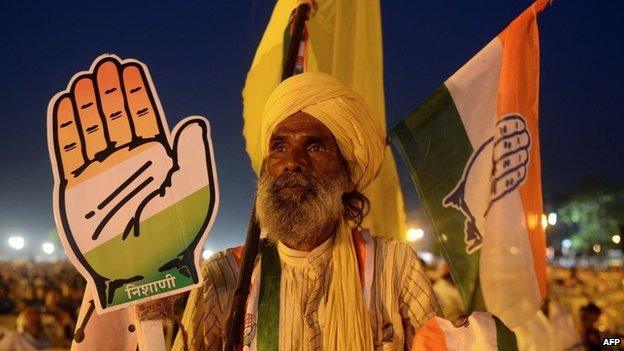Why did India's Grand Old Party suffer a poll rout?
- Published

Why did India's Grand Old Party suffer a historic drubbing in the general elections?
After all, India enjoyed social stability and 8.5% growth for most of the decade the Congress government was in power. It rolled out a number of welfare schemes which many believed improved public facilities in the poorest regions of India.
To be sure, growth halved, inflation spiralled and a number of embarrassing corruption scandals hit the government in its second term. Even so, how does that explain the party's worst-ever tally of under 50 seats?
Make no mistake, the scourge of unrelenting inflation turned the poor and the middle class against Congress: for the last three-and-a-half years India has been suffering its highest rate of inflation for 20 years, one that has also been higher than the world average.
This, many say, was the immediate trigger for people's anger and disenchantment with the Congress.
Then there was what many call the party's failure to adapt to a changing India, which was moving, in the words of one commentator, from a "petitional to an aspirational culture".
Congress leaders would say in private that their welfare schemes for the poor, led by a massive rural employment guarantee scheme, would fetch them enough votes in the villages to win the elections.
'Failure to adapt'
But the party possibly failed to realise that it is easier to spend large amounts of money on welfare schemes when the economy is growing and inflation is low, as was the case in the first five years of the government. In the second term growth was crawling, inflation was high and there was a current account deficit.
Also, selling welfare schemes caught up with the law of diminishing returns in an India which is increasingly young, restless and aspirational.
Every time Rahul Gandhi was reminding the people on the campaign that enrolment had gone up in the jobs-for-work scheme, he was tacitly admitting that the economy was in the doldrums. More money spent on dole implies that your economy is not doing well. It is not something a nation can be very proud of.
Again, when a rash of corruption scandals erupted in the government's stormy second term, all the senior leaders - PM Manmohan Singh, party chief Sonia Gandhi and vice-president Rahul Gandhi - were missing in action: none of them came out and assured the country they would crack down on graft.
Mr Singh and Ms Gandhi hardly spoke to the public and the media, and Rahul Gandhi was seen as a leader who refused to take responsibility.
Politics is all about adapting to changing circumstances and navigating change: the Congress party was not nimble enough to do so.
"It was a deep intellectual failure of the Congress to understand and adapt to changed circumstances. It continued with its politics of low aspiration," Pratap Bhanu Mehta of Delhi's Centre for Policy Research told me.
Narendra Modi stepped into this "moral, political and governance vacuum", as Aam Aadmi leader and political scientist Yogendra Yadav describes it, and fashioned himself as a hands-on modernising ruler, promising jobs and development during his campaign.
"I don't think Indians were yearning for an authoritarian leader. There was a sense that in Manmohan Singh we had a leader who was not discharging the leadership role appropriate to his office. There was a yearning for leadership that was inherent to the office," says Mr Mehta.
The rest, as we know now, is history.
